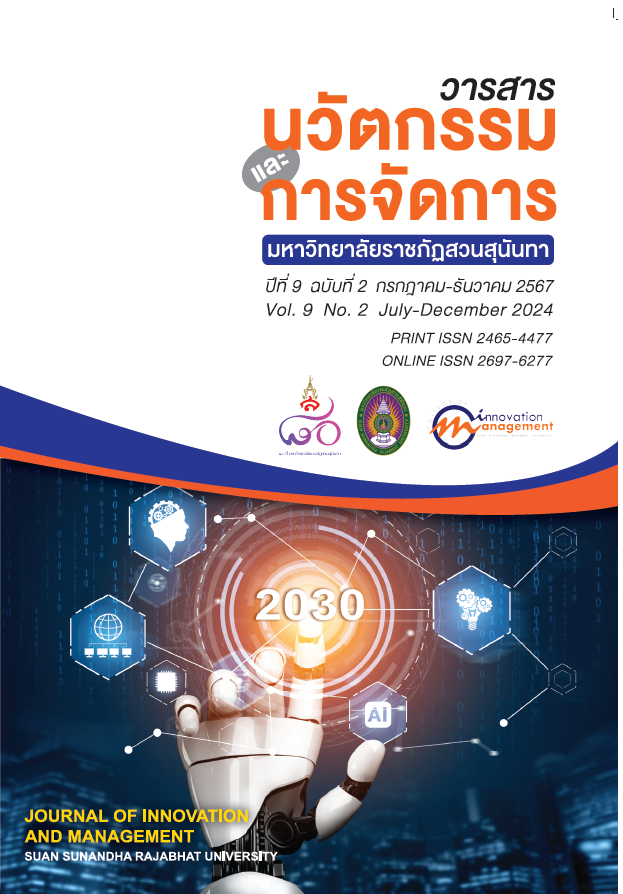A Model for Enhancing Students' Self-Management Skills in Public Universities in Guiyang City, Guizhou Province, China
Keywords:
Self-Management Skill, University Student, Learning strategyAbstract
The objective of this study was to develop a model for enhancing self-management skills among university students in public universities in Guiyang City, Guizhou Province, China. Using a mixed-methods approach, the research involved a stratified random sample of 1,509 students from three major universities in Guiyang, ensuring a diverse and representative sample. The study focused on seven key self-management skill areas: Self-Motivation, Social Skills, Time Management, Emotional Regulation, Healthy Habits, Goal Setting and Execution, and Learning Strategies. Data analysis utilized the Priority Needs Index (PNImodified), with results indicating a mean PNImodified value of 0.461 for overall self-management skills. Self-Motivation (0.599), Social Skills (0.549), Time Management (0.501), Emotional Regulation (0.480), and Healthy Habits (0.471) were identified as priority areas for improvement, while Goal Setting and Execution (0.302) and Learning Strategies (0.30) were recognized as relative strengths. The model development was based on the identified priority areas, incorporating key theories to build a conceptual framework. The model was then validated by a panel of experts, ensuring its applicability and effectiveness in enhancing selfmanagement skills. This study provides valuable insights for educators and policymakers, offering targeted recommendations for interventions to improve students' self-management skills in Chinese universities.
References
Bandura, A. (1997). Self-efficacy: The exercise of control. W. H. Freeman.
Chen, X. (2020). A review of research on autonomous English learning. Advances in Social Sciences, 9(2), 188–194.
Chen, X., and Wong, Y. L. (2018). Cultural adaptation and resilience: A new perspective on the challenges faced by Chinese students in higher education. Journal of International Students, 8(1), 347–366.
Dasmadi, D. (2023). Leadership models in modern organizations. Enrichment: Journal of Management, 12(6), 4646–4650. https://doi.org/10.35940/ijeat.f4355.0612623
Handayani, M. S., Wangid, M. N., and Julius, A. (2021). The impact of self-management techniques to improve university students’ social cognition. Islamic Guidance and Counseling Journal, 4(1), 116–123.
Huang, J. C. (2023). Implementation effect of integrating cooperative inquiry into blended learning: Analysis of students’ goal setting, task value, and well-being. Interactive Learning Environments, 1–16. https://doi.org/10.1080/10494820.2023.2168531
Kosaseang, S. (2023). Need assessment and development guidelines for effectiveness. Management, 32(7), 566–576.
Krejcie, R. V., and Morgan, D. W. (1970). Determining sample size for research activities. Educational and Psychological Measurement, 30(3), 607–610.
Liu, L. Y., and Wang, H. L. (2016). Research on the relationship between college students’ interpersonal relationship, self-regulated learning, and mobile phone dependence. Advances in Psychology, 6(7), 836–845.
Meier, A. (2022). Studying problems, not problematic usage: Do mobile checking habits increase procrastination and decrease well-being? Mobile Media & Communication, 10(2), 272–293. https://doi.org/10.1177/20501579211029326
Niu, S. J., Niemi, H., and Furman, B. (2022). Supporting K-12 students to learn social-emotional and self-management skills for their sustainable growth with the solution-focused kids’ skills method. Sustainability, 14(13), 7947. https://doi.org/10.3390/su14137947
Sajeevanie, T. L., and Tharuka, W. M. V. (2022). Impact of strategic self-management practices on academic success with the moderating effects of self-leadership and time management practices: A study based on management undergraduates of the selected state universities in Sri Lanka. Wayamba Journal of Management, 13(2). https://doi.org/10.4038/wjm.v13i2.7543
Shen, P. (2022). A brief analysis on the self-management ability of students in higher vocational colleges. The Proceeding of the 6th STIU International Conference, 258–268.
Wang, W. C. (2019). Exploring the relationship among free-time management, leisure boredom, and internet addiction in undergraduates in Taiwan. Psychological Reports, 122(5), 1651–1665.
Yu, C. (2021). The relationship between undergraduate students’ creative self-efficacy, creative ability, and career self-management. International Journal of Academic Research in Progressive Education and Development, 2(2), 181–193.
Zhu, M., Bonk, C. J., & Doo, M. Y. (2020). Self-directed learning in MOOCs: Exploring the relationships among motivation, self-monitoring, and self-management. Educational Technology Research and Development, 68, 2073–2093. https://doi.org/10.1007/s11423-020-09747-8
Zimmerman, B. J. (2002). Becoming a self-regulated learner: An overview. Theory Into Practice, 41(2), 64–70.
Zimmerman, B. J., and Schunk, D. H. (Eds.). (2001). Self-regulated learning and academic achievement: Theoretical perspectives. Lawrence Erlbaum Associates Publishers.
Zwetsloot, R. (2020). China’s approach to tech talent competition: Policies, results, and the developing global response. Global China.
Downloads
Published
How to Cite
Issue
Section
License
Copyright (c) 2024 Journal of Innovation and Management

This work is licensed under a Creative Commons Attribution-NonCommercial-NoDerivatives 4.0 International License.
See Publication Ethics https://so03.tci-thaijo.org/index.php/journalcim/Ethics






